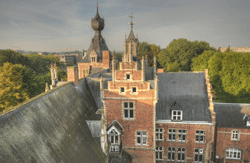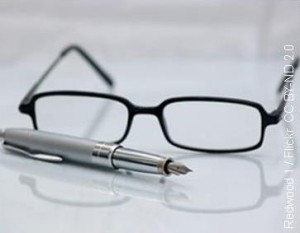 The CHCFE project is reaching the end of its work to produce a report on the multiple benefits of cultural heritage in Europe. In preparation for the report’s publication in date June 2015, members of the project’s Steering Committee held an informal meeting in Brussels on 15 April to finalise the committee’s policy recommendations based on the main findings of Cultural Heritage Counts for Europe. These recommendations for tapping into heritage’s full potential will be included in the first part of the report that also presents the institutional and policy context, the scope and scale and the main findings. The results of Cultural Heritage Counts for Europe will be presented on 12 June in Oslo, Norway in the larger framework of the 2015 Europa Nostra Congress.
The CHCFE project is reaching the end of its work to produce a report on the multiple benefits of cultural heritage in Europe. In preparation for the report’s publication in date June 2015, members of the project’s Steering Committee held an informal meeting in Brussels on 15 April to finalise the committee’s policy recommendations based on the main findings of Cultural Heritage Counts for Europe. These recommendations for tapping into heritage’s full potential will be included in the first part of the report that also presents the institutional and policy context, the scope and scale and the main findings. The results of Cultural Heritage Counts for Europe will be presented on 12 June in Oslo, Norway in the larger framework of the 2015 Europa Nostra Congress.
On 2 February, the Cultural Heritage Counts for Europe project held its 5th Steering Committee meeting in Leuven, Belgium. Europa Nostra, the project leader, chaired the meeting. 14 representatives from the project’s six partners were in attendance.
The project is moving closer to the delivery of its main output – a report on the multiple benefits of cultural heritage in Europe. This meeting in Leuven was a valuable moment to discuss the key findings gathered by project partners the International Cultural Centre (ICC) in Poland and the Raymond Lemaire International Center for Conservatio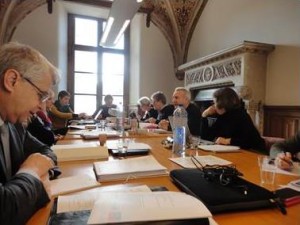 n (RLICC) in Belgium. The report uses a cultural heritage impact matrix to present in detail the potential of cultural heritage and its intersecting influences across all aspects of society: cultural, social, economic, and environmental. At the intersection or heart of the matrix is sustainable development. To accompany the report, the Steering Committee will produce a summary along with recommendations.
n (RLICC) in Belgium. The report uses a cultural heritage impact matrix to present in detail the potential of cultural heritage and its intersecting influences across all aspects of society: cultural, social, economic, and environmental. At the intersection or heart of the matrix is sustainable development. To accompany the report, the Steering Committee will produce a summary along with recommendations.
The results of these two years of gathering and analysing existing data and evidence on the impact of cultural heritage in Europe will be presented at the project’s final conference on 12 June 2015 in Oslo, Norway, held in the framework of the Europa Nostra Congress.
The time in Leuven was also used to discuss the project’s sustainability after it concludes in June 2015. It is clear the work done by the project to collect this evidence has great value to ensure the preservation of knowledge. Gathering evidence, often quite dispersed across the European continent, makes it more likely important research will not be overlooked. SC members spoke about possibilities to continue the collection of existing data, evidence, literature, discourse and policy review, and case studies to further understand the impact of Europe’s cultural heritage and raise awareness in order to demonstrate its value.
 Cultural Heritage Counts for Europe project partners and members of its Steering Committee are preparing to meet in Leuven, Belgium on 2 February 2015. As the project moves closer to finishing its report and recommendations, this meeting in Leuven will be a valuable moment to discuss the findings gathered by project partners the International Cultural Centre (ICC) and the Raymond Lemaire International Center for Conservation (RLICC).
Cultural Heritage Counts for Europe project partners and members of its Steering Committee are preparing to meet in Leuven, Belgium on 2 February 2015. As the project moves closer to finishing its report and recommendations, this meeting in Leuven will be a valuable moment to discuss the findings gathered by project partners the International Cultural Centre (ICC) and the Raymond Lemaire International Center for Conservation (RLICC).
With the support of the CHCFE consortium, ICC and RLICC have been working since the beginning of 2014 to collect existing evidence and many case studies, European projects, as well as European, national, regional and local research and reports covering cultural heritage’s multiple benefits of in different parts of Europe. The intended result is a detailed cultural heritage impact matrix able to present cultural heritage’s potential and its intersecting influences across all aspects of society. Moreover, the report will serve as a credible basis for policy recommendations that reflect an integrated and holistic approach towards the increased importance of heritage for today and the future.
This will be the 5th meeting for the CHCFE Steering Committee. The Steering Committee is responsible for overseeing the project’s ambition to deliver a comprehensible and comparative overview of the value and relevance of heritage in Europe. In Leuven, the group will also discuss the project’s valorisation and exploitation as well as the preparation of conclusions and final conference to be held on 12 June 2015 in Oslo, Norway. In Oslo, the outcomes and policy recommendations will be shared with an audience composed of heritage professionals, academics, researchers, policy makers and high-level representatives from EU institutions and Member States gathered for the 2015 European Heritage Congress organised by CHCFE partner, Europa Nostra.
The fourth Steering Committee meeting of the CHCFE project took place on 16 October in Krakow. Hosted by CHCFE partner, the International Cultural Centre, 12 representatives of the six project partners were in attendance. The purpose of this meeting was to have progress reports from the two teams responsible for mapping and analysing the multiple benefits of Europe’s cultural heritage and to discuss the project’s draft report and recommendations.
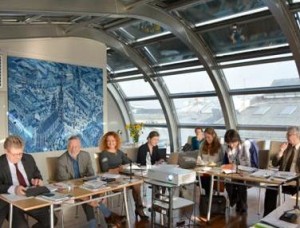 Since the beginning of the year, teams from the International Cultural Centre (ICC) in Poland and the Raymond Lemaire International Center for Conservation (RLICC) in Belgium have been collecting existing evidence on the impact of cultural heritage in Europe through extensive desk research, contributions from the heritage sector via an online survey, and by working with national experts in 11 countries. Now in the phase of analysing this evidence, ICC and RLICC are elaborating a cultural heritage impact matrix to present in detail the potential of cultural heritage and its intersecting influences across all aspects of society with a specific focus on Europe’s economy, society, culture and environment.
Since the beginning of the year, teams from the International Cultural Centre (ICC) in Poland and the Raymond Lemaire International Center for Conservation (RLICC) in Belgium have been collecting existing evidence on the impact of cultural heritage in Europe through extensive desk research, contributions from the heritage sector via an online survey, and by working with national experts in 11 countries. Now in the phase of analysing this evidence, ICC and RLICC are elaborating a cultural heritage impact matrix to present in detail the potential of cultural heritage and its intersecting influences across all aspects of society with a specific focus on Europe’s economy, society, culture and environment.
ICC organised two additional events open to the public entitled “What is Heritage Worth?”: first an international debate on the evening of 16 October and an open lecture on the evening of 17 October. The aim was to nourish the Steering Committee discussions, present the project to a wider Polish and Central European audience, and broaden knowledge on the topic of cultural heritage’s impact in Europe.
The international expert debate with Péter Inkei, Monika Murzyn-Kupisz, Christian Potiron and Kate Pugh, chaired by Joanna Sanetra-Szeliga gathered over 40 people (academics, students, practitioners) interested in the four pillars of impact of cultural heritage on various spheres of life that were identified as a part of the project (economy, society, environment, and culture). During the debate experts presented the pillars and discuss various approaches to measuring the value of heritage.
The following day a renowned expert of heritage management and urban tourism, Professor Gregory J. Ashworth, gave a lecture to over 80 participants on heritage as a means of using the past for the contemporary purposes. Heritage directly and indirectly influences socio-economic development. Although widely attempted, there is no universal model for success of heritage-led development projects. It might happen that such a project fails as aside the benefits there are costs to be born as well. The lessons are to be learned from practice, but they are the lessons of careful management and not the lessons of automatic imitation of successful projects already implemented somewhere else.
These two events helped project partners to collect additional information, opinions and recommendations regarding evaluation practices that can be useful for the project’s final report which will be presented to the public on 12 June in Oslo on the occasion of the Europa Nostra Annual Congress 2015.
The CHCFE Steering Committee will meet again on 2 February 2015 in Leuven, Belgium just prior to the start of the Thematic Week “Heritage Counts” (3-6 February) organised by the Raymond Lemaire International Centre for Conservation (RLICC) at KU Leuven. This event, which grew out of the valorisation actions implemented within the Cultural Heritage Counts for Europe project, will bring together European policymakers and international researchers involved in cultural heritage. The Thematic Week will deal with the economic, social, environmental and cultural impact of cultural heritage and aims to provide an international overview of discourse, strategies and case studies. Click here for more info on the Thematic Week.
The 4th Steering Committee meeting of the Cultural Heritage Counts for Europe project will be held in Krakow, Poland from 16-17 October 2014. Hosted by CHCFE project partner, the International Cultural Centre, CHCFE Steering Committee members will meet for two days to discuss their collection and analysis of existing research on the impacts of cultural heritage.
A Central European Round Table is also being planned. Steering Committee members will be joined by leading heritage specialists from Central Europe, including experts who participated in the collection of existing research and texts on the multiple benefits of cultural heritage. The aim of this round table is to broaden knowledge on the subject, foster trans-European discussions, and raise awareness on the particularities of heritage in the Central European region and specific countries.
Project partners will summarize their work and findings in a final report due in June 2015 which aims to present solid and persuasive arguments for convincing policy and decision makers on the impact and multiple benefits of investing in European heritage.
The European cooperation project ‘Cultural Heritage Counts for Europe: Towards a European Index for Cultural Heritage’ organised the third meeting of its Steering Committee on 19 May in Leuven, hosted by one of the project’s partners, the Raymond Lemaire International Centre for Conservation. Representatives from the consortium’s six partners came together to discuss the progress made in the implementation of the project, with a special emphasis on the collection of existing data on the impact of Europe’s cultural heritage on society and the economy.
Since the beginning of 2014, the International Cultural Centre in Poland and the Raymond Lemaire International Centre for Conservation (KU Leuven) in Belgium have been gathering and analysing hundreds of existing research documents, reports and case studies that demonstrate heritage’s social, cultural, economic and environmental benefits on society as well as its impact on smart, sustainable, inclusive growth and quality of life.
The result of this collection and analysis will be presented in mid-June 2015 during the Europa Nostra’s Annual Congress in Oslo. The aim is to raise greater public awareness on the multiple benefits of cultural heritage and present policy recommendations to the EU Institutions for tapping into heritage’s full potential.
The next Steering Committee meeting will be organised in October at the International Cultural Center in Krakow, Poland.
The cooperation project ‘Cultural Heritage Counts for Europe’ is supported by the Culture programme of the European Union.
Mid-May 2014, “Cultural Heritage Counts for Europe” project partners will meet in Leuven, Belgium for the 3rd Steering Committee meeting. Hosted by the Raymond Lemaire International Centre for Conservation (RLICC), project partners will gather to discuss the onling gata collection, analysis and consolidation, methodology the future steps as the project partners prepare the Final Report due to be delivered in 2015.

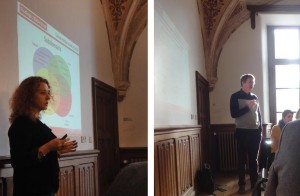
![img-394[1]](http://www.encatc.org/culturalheritagecountsforeurope/wp-content/uploads/2014/05/img-3941.jpg)
